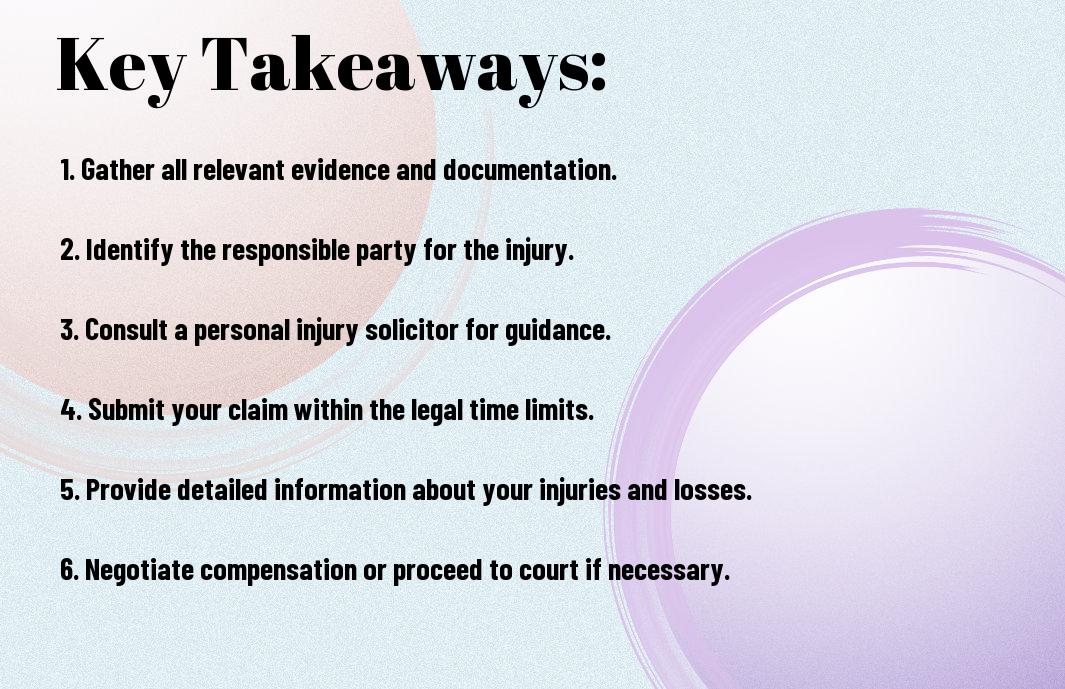Many individuals find themselves needing to file a personal injury claim in the UK due to accidents or negligence. Understanding the process can significantly impact the outcome of your claim. This guide will walk you through the important steps you need to take, including gathering evidence, understanding the legal terms, and knowing what to expect in terms of compensation. By familiarizing yourself with these key elements, you can navigate your claim more effectively and ensure that your rights are protected throughout the process.
Key Takeaways:
- Gather Evidence: Collect all relevant documentation, including medical reports, photographs of the injury or accident scene, and witness statements to support your claim.
- Time Limits: Be aware of the legal time limits for filing a personal injury claim, which is generally three years from the date of the accident.
- Seek Legal Advice: Consider consulting a personal injury solicitor to help navigate the claims process and ensure that you receive fair compensation.
Understanding Personal Injury Claims
For anyone considering a personal injury claim in the UK, it’s vital to understand the process involved. Personal injury claims arise when an individual suffers harm or injury due to someone else’s negligence. This can encompass a wide range of incidents, and you can get more insights on Making a Personal Injury Claim to gauge the steps you should undertake.
Types of Personal Injury Claims
Among the various types of personal injury claims, you may encounter several categories that reflect different circumstances of injury:
| Road Traffic Accidents | Workplace Injuries |
| Medical Negligence | Slip and Fall Accidents |
| Product Liability | Defamation |
| Asbestos Exposure | Animal Attacks |
| Intentional Infliction of Emotional Distress | Others |
Assume that the type of claim you wish to file will significantly influence the approach you need to take and the evidence you will be required to gather.
Legal Basis for Claims
By understanding the legal foundations of personal injury claims, you can strengthen your position. Personal injury claims generally hinge on proving that the other party was negligent or breached a duty of care owed to you, resulting in your injuries or losses.
Due to this requirement, gathering evidence like medical records, witness statements, and accident reports becomes imperative. Understanding the legal parameters that underpin your case will not only help in filing your claim but also in resolving disputes that might arise during the process. Getting advice from a legal expert can facilitate your navigation through these complexities effectively.

Initial Steps to Take After an Injury
Clearly, after an injury, it’s necessary to take immediate actions that can significantly affect the outcome of your personal injury claim. Ensure your safety first, then make a note of the circumstances surrounding the incident, including any witnesses and their contact details. This proactive approach lays a solid foundation for your claim and helps you establish the facts of the event.
Seeking Medical Attention
Among the first things you should do after sustaining an injury is seeking medical attention. Regardless of the severity of your injury, consulting a healthcare professional not only prioritizes your health but also creates an official medical record. This documentation can be invaluable when substantiating your claim later on.
Gathering Evidence
With your health attended to, focus on gathering evidence related to your injury. Collect photographs of the scene, any visible injuries, and ensure you have witness statements. This comprehensive documentation reinforces your case and helps establish liability.]
To effectively gather evidence, you should document everything related to the incident as soon as possible. Take clear photographs of the location where the injury occurred, capturing any relevant details such as hazardous conditions or the positions of vehicles involved. Keep a record of all medical appointments, including notes on your injuries and their treatment. If there were witnesses, obtain their contact information and ask them for a brief statement about what they saw. Additionally, maintaining a diary of your recovery process can be beneficial for illustrating how the injury has impacted your daily life, which could enhance your claim.
Time Limits for Filing a Claim
Despite the importance of acting promptly, you need to be aware that there are specific time limits for filing a personal injury claim in the UK. Generally, you have three years from the date of the incident to initiate your claim. For more detailed guidance on this process, refer to Compensation after an accident or injury: Write a letter ….
The Limitation Period
Besides the standard three-year limitation period, this time frame may differ in certain circumstances. For example, if your injury was not initially apparent, the three years may begin from the date you became aware of the injury’s impact.
Exceptions to the Time Limits
Limits do exist which could extend the time you have to file a claim. These exceptions apply under special circumstances, such as when the injured party is a minor or lacks the mental capacity to make a claim.
Another important aspect to consider is that if you were under 18 years old at the time of the accident, your three-year period won’t start until your 18th birthday, effectively giving you until you turn 21 to file your claim. Similarly, if you lack the mental capacity to pursue a claim, the time limit may be put on hold until you regain that capacity. It’s advisable to consult a legal professional to understand your specific situation better.

How to File Your Claim
Unlike some legal processes, filing a personal injury claim in the UK can be relatively straightforward if you follow the correct steps. Start by gathering the necessary documents, then proceed to submit your claim to ensure you receive the compensation you deserve.
Preparing Necessary Documents
Necessary documents for your personal injury claim include medical records, photographs of the accident scene, witness statements, and any correspondence with insurance companies. Collecting these materials will help support your claim and strengthen your case.
Submitting Your Claim
Documents pertaining to your case should be compiled and organized before submission, ensuring that all relevant information is included. You will typically start by contacting a solicitor or making a claim directly through the relevant insurance provider.
Claim submission can be done through a personal injury solicitor or online via designated platforms. Be sure to provide all pertinent documents and a detailed account of your injuries and experiences. Effective communication and prompt action will assist in moving your case forward smoothly.
The Role of Solicitors in Personal Injury Claims
Once again, the importance of solicitors in personal injury claims cannot be understated. They are your legal advocates, helping you navigate the complexities of the claim process. A solicitor will assess your case, gather evidence, negotiate with insurers, and represent you in court if necessary. Their expertise ensures you have the best possible chance of receiving fair compensation for your injuries and losses.
When to Hire a Solicitor
Behind many successful personal injury claims is a qualified solicitor. You should consider hiring one as soon as you experience an injury, particularly if it complicates your recovery or affects your quality of life. A solicitor can provide valuable guidance and support from the early stages, ensuring you follow the correct procedures and protect your legal rights.
Costs and Fees Involved
The costs and fees involved in hiring a solicitor for your personal injury claim can vary significantly. Many solicitors operate on a “no win, no fee” basis, where you only pay if your claim is successful. Additionally, you may encounter other expenses, such as court fees or medical reports, which should be discussed upfront with your solicitor to avoid surprises.
In addition to the contingency fees, it’s important to understand any additional costs that may arise during the claims process. You might be required to cover expenses like expert witness fees or medical assessments, which can be claimed back if your case is won. Before proceeding, always ask your solicitor for a detailed breakdown of potential costs, so you can make informed decisions and avoid financial strain during the process.
The Claims Process
Now that you understand the basics of personal injury claims, it’s important to know that the claims process typically involves several key steps, including gathering evidence, negotiating with the opposing party, and potentially going to court. You must be prepared to navigate each of these stages carefully to ensure that your rights are protected and that you receive fair compensation for your injuries.
Investigating Your Claim
Investigating your claim involves collecting evidence to substantiate your case. This process includes gathering medical records, witness statements, accident reports, and any other documentation that can support your claim. The more comprehensive your evidence, the stronger your case will be when negotiating with insurance companies or presenting your case in court.
Negotiating a Settlement
Investigating begins to fold into negotiation when you present your case to the insurance company or the responsible party. You will typically start by submitting a detailed claim that outlines the extent of your injuries and the compensation you seek.
In fact, many personal injury cases are resolved through negotiation rather than going to trial. During this stage, you’ll engage in discussions with the insurance company about the compensation amount. It’s imperative to be well-informed about the value of your claim and prepared to counter any low offers. A solid investigation and a clear presentation of your evidence will help you negotiate a fair settlement that reflects your damages.
To wrap up
Taking this into account, filing a personal injury claim in the UK involves several key steps, including gathering evidence, seeking medical attention, and submitting your claim within the designated time frame. It’s important to document all relevant details and consult with legal professionals to strengthen your case. By following these guidelines, you can navigate the process more effectively and improve your chances of receiving fair compensation for your injuries. Stay informed and proactive to ensure that your rights are protected throughout your claim journey.
FAQ
Q: What steps should I take immediately after an accident to support my personal injury claim?
A: After an accident, your immediate priority should be your health and safety. Seek medical attention for any injuries. Once safe, gather evidence by taking photographs of the accident scene, collecting contact information from witnesses, and noting down details of the incident. This information will be valuable when filing a personal injury claim in the UK.
Q: How long do I have to file a personal injury claim in the UK?
A: In the UK, you generally have three years from the date of the accident to file a personal injury claim. However, this timeframe can differ depending on the type of case. For example, if the injury involves a minor, the three-year period begins when they reach 18 years of age. It’s advisable to seek legal advice to confirm the specific time limits pertaining to your situation.
Q: What types of compensation can I claim for a personal injury?
A: In a personal injury claim, you can typically seek compensation for various damages. This includes general damages for pain and suffering, special damages covering medical expenses and lost earnings, and potentially future losses or expenses stemming from the injury. Each case is unique, so the compensation amount can vary significantly based on individual circumstances.
Q: Do I need a solicitor to file a personal injury claim?
A: While you can technically file a personal injury claim without a solicitor, it is often beneficial to have legal representation. A solicitor can provide expert guidance, help gather evidence, value your claim accurately, and negotiate with insurance companies on your behalf. This support can increase the likelihood of a successful outcome.
Q: What is the “no win, no fee” arrangement, and how does it work?
A: The “no win, no fee” arrangement, also known as a conditional fee agreement, means that you only pay your solicitor’s fees if your claim is successful. If you lose the case, you will not have to pay the solicitor’s fees. This arrangement makes legal services more accessible, as it reduces the financial risk associated with pursuing a personal injury claim.



Recent Comments